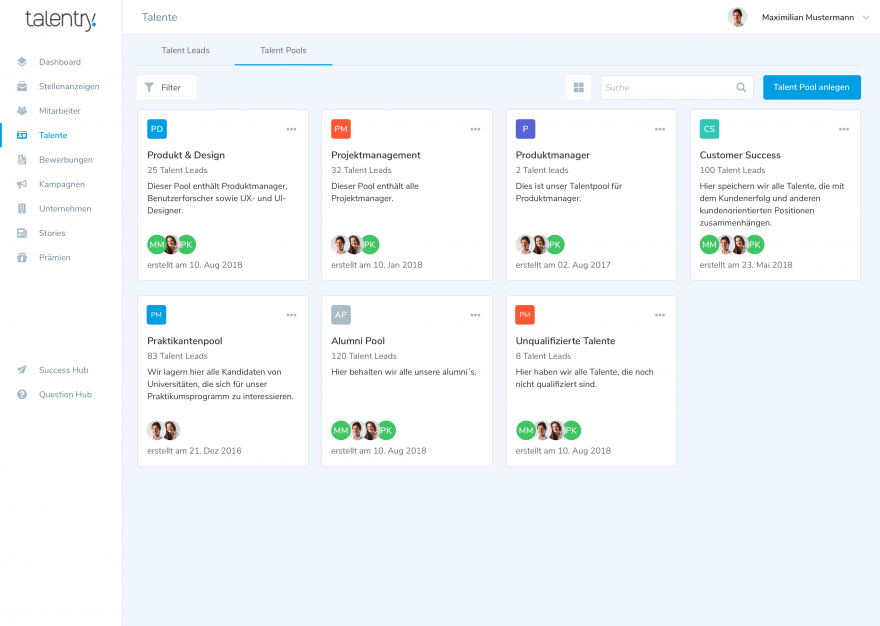The Munich startup Talentry offers a cloud-based recruitment marketing platform. We spoke with founder and CEO Carl Hoffmann about how Talentry went from a student startup to a young company with more than 50 employees, why trust and luck are important and how their potential path to becoming a unicorn might look.
The recruitment marketing platform Talentry helps companies’ recruiting departments operate like marketing and sales professionals. It also helps companies establish an employer brand to attract potential candidates, get them excited about the company and recruit them faster. Talentry wants to counter the shortage of skilled professionals with its idea. The Munich startup’s cloud software also makes it possible for companies to win over potential candidates and then — automatically — stay in contact with them. Because employee referrals are a key element in recruiting strategies, the Munich startup focusses directly on that channel and has digitized it. Employees simply share job advertisements on their social networks or directly refer the appropriate contacts from their network who match certain positions.

But that isn’t all it can do, explained Talentry CEO Carl Hoffmann:
“Employees become not only recruiters, but also brand ambassadors. In addition to job advertisements, they also share content on their social media profiles — such as blog posts or press releases.”
What’s particularly convenient for customers is that the reach generated by the content can be measured in shares and clicks. A new addition to the product portfolio is something known as “candidate relationship management.” It allows companies to establish talent pools, to strategically nurture relationships with potential candidates and to win them over to work for the company. The approach is similar to “customer relationship management” in marketing and sales. That’s also where recruiting is heading, said Hoffmann:
“We’re developing this kind of solution in close cooperation with our customers. There is a real need for tools to manage relationships, because classic systems for managing candidates simply don’t cover the entire recruiting process.”
A focus on customers and trends
Close to customers, on track with trends. That seems to be a part of Talentry’s recipe for success. One of their customers is also a successful young company, namely the Munich unicorn startup Celonis. Celonis now generates 25 percent of all of their appointments through employee referrals, said Talentry founder Hoffmann. In the beginning the numbers were only 5 to 10 percent. The solution is also not only used by startups. A major milestone was gaining big customers like Henkel, Daimler and KPMG. Their customers are satisfied and say so as well. Hoffmann reported:
“We’ve always been motivated by positive feedback from our customers in combination with the growing belief within the team that we will be able to build a truly great company in our segment.”

A lot has happened since Talentry’s founding in 2013. The product has been developed significantly. The launch of the Talentry CRM was definitely the biggest development, because it gives the company a broader positioning and moves it towards being a platform solution. The number of employees has grown to 50, and the plan is to grow by another 20 colleagues by then end of 2019.
Financial support, trust and expertise
It’s not just innovative product launches, additional employees and new customers that demonstrate how well the Munich startup is doing. Hoffmann also traces it back to another area:
“An aspect of our success is the trust that was placed in us by well-known investors.”
The HR startup was able to report financing amounting to more than two million euros in 2016 from Global Founders Capital, Rocket Internet Capital Partners and Picus Capital (mainly funds from the Samwer brothers). 2018 brought along another round of financing amounting to six million euros, which also included Nauta Capital, the IT and recruitment agency Allgeier and business angels like Bastian Nominacher from Celonis. SAP Hybris founder Carsten Thoma is also on the impressive advisory board, which gives Talentry a great deal of access to expertise in the field of enterprise software.
Talentry has referred to itself at one point or another as “one of the most successful European startups.” We wanted to find out what Carl Hoffmann bases that on. He said:
“We’ve been able to report significant growth in sales in the last three years and to continuously expand our positioning in the HR market. One in every ten DAX companies rely on our solutions and we also gained our first major customers at an international level in a short period of time.”
The company’s boss bases their successful corporate development on other factors as well. First and foremost, Hoffmann believes it’s the team and added:
“As a close second, I think the size of the target market and the timing, meaning why the world needs this kind of solution right now. The latter also has a lot to do with luck.”
Too much gut instinct, too little data
Of course it hasn’t always been smooth sailing for the young Munich company. There were some stumbling blocks on their path to success. For example, the Talentry founders started the company right after graduating and with very little prior knowledge – which meant they needed time to find the right product/market fit. Hoffmann gave us some inside information and recalled:
“Looking back, we paid too much attention to our gut feeling in the beginning and didn’t collect enough data.”
Today, Hoffmann said he would “employ BI resources” earlier on and more resolutely, which means integrating business intelligence and data-driven analysis into his own company. The founder explained why different types of data should be collected depending on the stage you’re in:
“In the beginning, it’s about proving the product/market fit, and then your focus should be on unit economics, which you need to master, and then on controlling how you scale — for example, don’t hire ten sales managers at once, increase your rate little by little instead. Sales recruiting as a whole is then a field of its own where we made mistakes that we learned a lot from.”
His ultimate tip for founders:
“Be focused in every area — and learn to say no early on.”
Last but not least, we wanted to know how Talentry plans to become the next unicorn. Hoffmann responded:
“With a lot of hard work, perseverance and the right amount of luck.”
